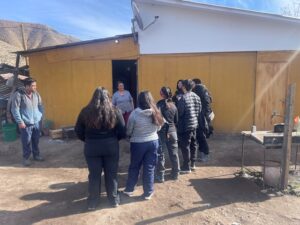Students from Geography of the University of Playa Ancha to develop academic activities in the field, guided by the race director, Carlos Romeroand the teachers Hernán Escobar and Gabriel Soto.
UPLA Communications.- The field trip carried out between July 27 and 29 had as protagonists the students of the subjects of Applied Geomorphology and Continental Hydrology, who carried out an analysis of the area from the perspective of these disciplines, as well as from outdoor education and conservation. of nature, and human geography focused on rurality.
In the success of the activity, the coordinated work of academics and students together with neighbors, muleteers and local actors who supported the logistics of the initiative, and extended an invitation for future linking activities was fundamental.
The director of the Geography course, Carlos Romeromaintained that the field trip allowed the students to collect various data for later understanding, mapping and identification.
“In a geomorphological analysis, which was what the students did, the focus is on the study, description and explanation of the forms and processes that occur in the geographic space. The data collected in the field was multiple, from the simple observation of forms and processes for their subsequent chronological understanding, to obtaining coordinates of points, elements or geomorphological units, for their subsequent mapping and identification in cartography or in perception products. remotely, such as aerial or satellite imagery. This type of information is vital for different types of studies and is also useful or applied in disaster reduction. Added to the above was a comprehensive analysis that considered outdoor education and nature conservation and human geography focused on rurality”, explained the academic.
Regarding the relevance of the execution of this activity, the career director stated that field training for future geographers is essential. “Not only because they put into practice what they are learning in the classroom, but also because they learn to plan a field experience, based on their own safety and that of the team, as well as environmental ethics, as a first task. That means investing a lot of time and work before executing it and, as a second task, they learn the complexity of the territories, their forms of organization, their problems, but we also enjoy their inhabitants and their landscapes”.















Add Comment